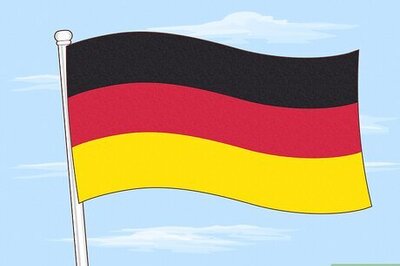
views
Oslo: Norwegian police on Thursday ended a six-day search for bodies on the island where Anders Behring Breivik shot dead 68 people, and said they were increasingly certain he acted alone.
Breivik, 32, killed a total of 76 people, in a bomb attack in central Oslo and then in the shooting rampage at the island summer camp for the ruling Labour Party's youth wing.
"The search at Utoeya (island) has been completed," police Chief of Staff Johan Fredriksen told a news conference.
A search for bodies in the surrounding Tyrifjord lake was continuing. Police had received a number of bomb threats but these were not considered credible, Fredriksen said.
Police said they were trying to reassure Norwegians after the worst attack in their modern history.
"In general we are trying to be visible to the public to try to contribute to the sense of security," he said.
Chief national prosecutor Tor-Aksel Busch said Breivik would not go on trial until 2012 and that additional charges might be brought, to include crimes against humanity as well as terrorism charges.
"We hope we can carry out a trial in the district court during next year," he told public broadcaster NRK.
Wearing a police uniform, Breivik massacred youths trapped on the island and shot at those who tried to swim to shore some 500 metres away. Authorities believe some may have drowned.
Police published the names of 24 more of the dead on Thursday, raising the total identified to 41.
Breivik has told police he was not a lone wolf but part of a network in a "crusade" against Islam and multiculturalism, but Norwegian authorities say they doubt this.
"We have to consider the possibility but at this moment we have no indication of that," police lawyer Paal-Fredrik Hjort Kraby said. "He said in his manifesto that he was all alone and we are trying to find out if this is correct."
Police will interrogate Breivik on Friday for the second time since he was arrested. Investigators have been working in cooperation with other European nations and the United States.
"Clear warning" for Europe
The risk of copycat bombings remains low, police said, even though the attack comes against a backdrop of rising anti-immigrant sentiment in Europe as countries struggle to contain debt crises and revive flagging economies.
"Europe has received a clear warning from Norway," wrote Thorbjoern Jagland, the former Norwegian prime minister who is now the leader of the Nobel Peace Prize committee and Secretary General of the Strasbourg-based Council of Europe.
"It's possible that Breivik has operated completely alone. But I'm afraid he may have initiated a new trend. While we've all been preoccupied with Muslims and radical Islam, this has been allowed to quietly develop," Jagland wrote in an article called "The racism in Europe" published by daily Aftenposten.
"We see a new form of nationalism, in a new disguise. But the old wisdom is still valid: all nationalism comes from something bad and leads to something bad."
Austria's main far-right party, sensitive to criticism about its anti-foreigner stance as it seeks election in 2013, expelled one of its parliamentary representatives on Thursday for comments about the Norway attacks.
Freedom Party official Werner Koenigshofer wrote on social networking site Facebook that "the Islamists in Europe have attacked a thousand times more often," and on his website said the massacre of children should make people rethink abortion.
The remarks were widely reported in Austria media before disappearing. "He got the red card because of this behaviour, which is damaging for the party," Freedom Party leader Heinz-Christian Strache said in a statement.
"Not human"
Norway has promised a review of the country's security services and their actions during Breivik's attacks. Police have come under criticism, including from some survivors, for taking an hour to get to the island 42 km (28 miles) from Oslo.
On a pier jutting out from a campsite across the lake from Utoeya, where some of the survivors first reached shore, mourners laid flowers, lit candles and left messages for the dead.
Pictures and children's drawings adorned the site. One crayon drawing showed the green island and dozens of faces in the waters around it.
"What happened here is not human," said social worker Heidi Weum Knutsen, looking out at Utoeya. "Young innocent people were hunted down and killed. That is the worst thing someone can do."
Paramedic Haavard Larsen, who coordinated the health services' response to the island shootings last Friday, said many survivors were completely silent when they made it to shore.
"It's difficult to describe but if you saw old movies from concentration camps, that was a little bit their impression -- empty looks, extremely traumatised," Larsen said.
"One of my colleagues was trying to help a child ashore, and the kid stepped back and asked -- 'are you going to shoot me?'"
Clinical psychologist Therese Brask-Rustad, who helped the victim's families, said Breivik intentionally played on Norwegians' overwhelming trust in the police force of the affluent and usually peaceful Nordic state.
"He shattered their belief about who can be trusted. Shattered their assumptions about the world. It's a wonderful holiday island that became a nightmare."
















Comments
0 comment